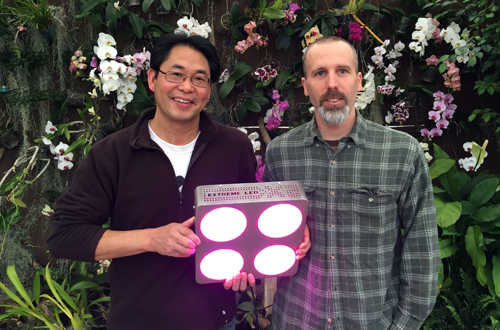
When most people think of LEDs, they might think of home or office lighting or even TVs. But a University of Guelph professor is using LED lights to help plants grow faster, stronger and more effectively.
Prof. Youbin Zheng, Environmental Sciences, is studying how different coloured LED (light-emitting diode) lights affect the growth of plants in greenhouses.
In a seven-month-long study with research associate Dave Llewellyn and technician Katherine Vinson, he compared LEDs with conventional high-pressure sodium (HPS) lighting systems for growing cut gerberas.
These greenhouse flowers require supplemental lighting from November to March. Supported by the International Cut Flowers Association, Zheng and his team worked with Lumigrow, a horticultural lighting company, and Rosa Flora, a greenhouse grower of cut flowers.
“LEDs are more energy-efficient, but we needed to see how the plants respond to these lights, and if it could be useful in a greenhouse environment,” said Zheng.
They found LED lights were more effective and efficient than conventional greenhouse lighting systems.
“The yield and quality of these cut flowers were as good or better when using LED lights, and we also saw an increased leaf photosynthetic rate,” he said.
“In addition, we found that the LED systems were much more energy-efficient, so that would mean lower energy requirements in greenhouse production.”
Although the study focused on cut flowers, Zheng said it might apply beyond ornamental plants.
“We could see this technology being used in a range of locations and for different produce, such as lettuce or other vegetables,” he said.
In climates where vegetables are particularly difficult and expensive to grow, such as in Canada’s North, the technology could make produce more accessible and affordable.
Cities might also find applications, he said.
“We’re seeing more and more people wanting to grow their own vegetables, to make sure their food is grown locally, but this can be very challenging in large cities such as Toronto,” he said.
“One possible solution is to make greenhouses or plant factories in tightly packed cities. That way, people can grow their produce locally, even while living in high-rise condos and surrounded by concrete.”
Zheng has extensively studied urban horticulture. His research team won the 2014 Cities Alive Research Award of Excellence in November for studies of green roofs for storm water management, moderating temperature and reducing heating and cooling costs of large buildings.
The team won for the paper “Optimal Growing Substrate pH for Five Sedum Species.”
He plans to examine how different coloured LEDs and the optimal intensities affect plant growth and qualities.
“With LEDs, it is easier to control the colour, so we are able to make the spectrum of colours for whatever the plants need, such as different shades of red or blue.”
Findings from the studies are expected to be published in 2015.